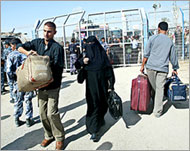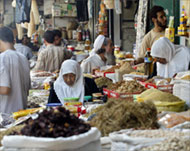Israel accused of stalling on Gaza
A top envoy has criticised Israel in tough language for moving too slowly on negotiations to open Gaza’s borders, saying the country is behaving almost as if the withdrawal from the Gaza Strip never happened.

James Wolfensohn, a special envoy working on behalf of the US and other foreign mediators, said in a report obtained on Monday by The Associated Press that without dramatic progress soon, a rare chance to revive Gaza’s shattered economy – and the peace process – would be lost.
Israel closed the Rafah crossing into Egypt, Gaza’s main link to the outside world, shortly before withdrawing from Gaza last month.
It has severely restricted the passage of Palestinian labourers and goods in and out of Israel, the main Palestinian export market, since a series of rocket attacks after the pullout.
Israeli concerns
Israeli officials say the measures are due to security considerations.
In his letter, Wolfensohn acknowledged such concerns but accused Israel of unnecessary delays in restoring movement across the borders.
 |
|
Israel has shut the Rafah border |
He said the stalling was preventing him from moving on to larger reconstruction efforts, such as tourism, agriculture and industrial projects.
“The government of Israel, with its important security concerns, is loath to relinquish control, almost acting as though there has been no withdrawal, delaying making difficult decisions and preferring to take difficult matters back into slow-moving subcommittees,” Wolfensohn wrote in the 17 October letter to UN Secretary-General Kofi Annan.
Wolfensohn said the differences could be quickly resolved and expressed disappointment he did not reach a solution during a trip to the region this month.
“While the Palestinians were eager to come to closure, (Israel) preferred to leave difficult questions to committees that will not meet until after the Jewish holidays,” he wrote. A month of Jewish holidays ends this week.
Key element
Among other issues, Wolfensohn said Israel delayed a key element of new border arrangements – the deployment of foreign inspectors from the European Union at Rafah.
The reopening of the borders is essential for economic recovery in Gaza, where unemployment is more than 30%.
“We all were hoping after the withdrawal the economic recovery will be enhanced. What has happened is exactly the
contrary,” said Palestinian Planning Minister Ghassan
Khatib.
 |
|
The closure has hampered |
“In the current situation, Gaza is really like a big prison.”
The Israeli closures have cast a pall over Gaza during the current Muslim fasting month of Ramadan – normally a time of celebration and shopping.
With imports greatly hampered, shelves are bare, fruits such as apples and bananas are hard to come by, and merchants say their businesses face ruin.
Basim Said, owner of a clothing shop in Gaza City, said he had been waiting for weeks for a shipment to arrive from Turkey through an Israeli cargo crossing.
“I have only a few things left from last year’s collection, and my customers are leaving my shop,” he said. “The crossing is like oxygen for us.”
Palestinians criticised
In his letter, Wolfensohn also criticised the Palestinians for raising salaries during a fiscal crisis, for their inability to control violence and chaos, and the Palestinian Authority’s inability to function properly.
“My … agenda is only a beginning – but it is a gateway through which we must step if we are to get back to the
road map, and move to a settlement of this bitter and wasteful conflict,” wrote Wolfensohn, referring to the
stalled road map peace plan.
|
“The government of Israel, with its important security concerns, is loath to relinquish control, almost acting as though there has been no withdrawal” James Wolfensohn, |
Israeli Foreign Ministry spokesman Mark Regev said the government wanted Gaza to be a success story and understands the need to reopen the border crossings. But he said Israel’s security must be kept in mind.
“We have to move ahead on the crossings issue by balancing the very real security threats with the desire to allow for maximum possible movement of people and goods,” Regev said.
In a separate development, Israel’s Army Radio said Defence Minister Shaul Mofaz would travel to Egypt on Wednesday for talks on the border issue, and officials said the Israeli cabinet would discuss the matter on Sunday.
Reason for caution
Israeli officials pointed to last month’s rocket barrage out of Gaza, as well as ongoing violence in the West Bank, as reason for moving with caution.
In the latest fighting, Israeli occupation troops killed an Islamic Jihad leader and a close accomplice in a pre-dawn shootout in the Tulkarim refugee camp.
The wanted man, Luai al-Saadi, was the leader of Islamic Jihad group’s military wing in the West Bank and was accused of the deaths of 12 Israelis in a series of attacks in recent months.